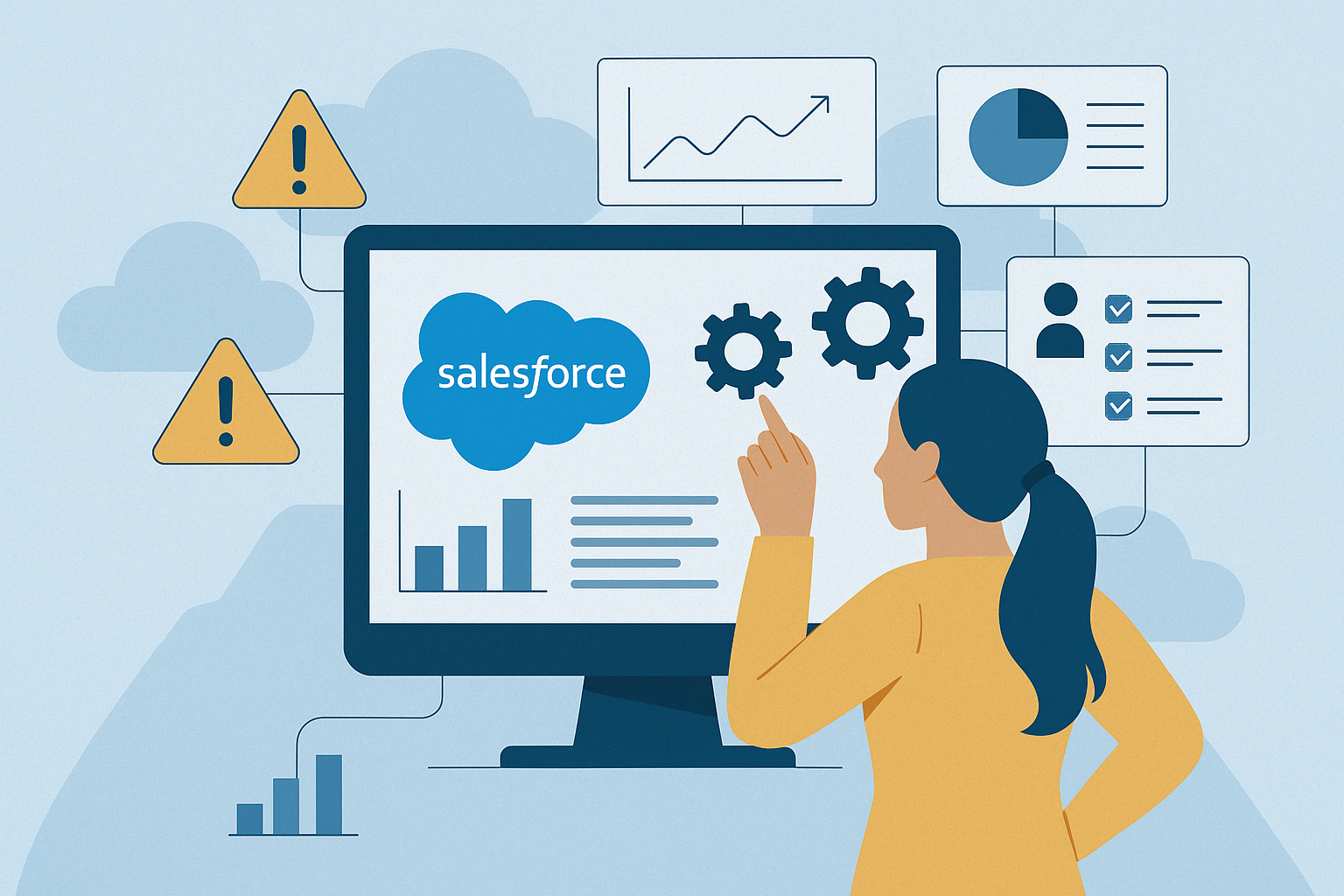 Get SEO-Optimized Articles – Written for Humans, Loved by Google!
Get SEO-Optimized Articles – Written for Humans, Loved by Google!
12 Questions to Ask Before Hiring a Salesforce Integration Consultant
Written by Harry Johnson » Updated on: June 17th, 2025

Hiring the right Salesforce Integration Consultant can be the key to a successful Salesforce project. Whether you’re integrating Salesforce with other business systems, customizing workflows, or automating tasks, it’s essential to select a consultant with the right skills and expertise. But how do you know which consultant is the right fit for your project?
The best way is to ask the right questions during the evaluation process. Here are 12 important questions you should ask before hiring a Salesforce Integration Consultant.
1. What Salesforce Certifications Do You Hold?
Certifications are an essential indicator of a consultant’s knowledge and expertise. Salesforce offers various certifications to validate consultants' skills across different areas, such as Salesforce Administrator, Salesforce Integration Architecture Designer, and Salesforce Application Architect. By asking about certifications, you can gauge whether the consultant has the technical competence required for your project.
Why It’s Important: Certified consultants have proven expertise, ensuring they are familiar with the best practices, the latest updates, and new features in the Salesforce ecosystem.
2. What Experience Do You Have with Salesforce Integrations?
Experience matters when it comes to Salesforce integrations. Ask the consultant to share details about previous integration projects they have worked on. What tools did they use? Did they integrate Salesforce with any major ERPs, CRMs, or third-party applications? Understanding their prior experience will help you assess whether they can handle the complexities of your project.
Why It’s Important: Experienced consultants are better equipped to handle challenges, optimize integrations, and ensure seamless communication between systems.
3. What Integration Tools Are You Proficient In?
Salesforce integration involves using a variety of tools, including MuleSoft, Boomi, Zapier, and custom-built APIs. You should ask which integration tools the consultant is proficient in and if they have experience with the tools that fit your specific needs. For instance, MuleSoft is ideal for enterprise-level integrations, while Zapier is suited for smaller-scale automations.
Why It’s Important: The consultant’s familiarity with the right tools ensures they can execute the integration efficiently and cost-effectively.
4. How Do You Handle Data Migration?
Data migration is often a crucial part of any integration project. A skilled Salesforce Integration Consultant should have experience in managing data migration, ensuring data integrity, and resolving issues like duplicates, errors, or mismatches. Ask how they plan to approach your data migration and what steps they’ll take to ensure the accuracy and security of your data.
Why It’s Important: Improper data migration can result in the loss of crucial business data, duplicate records, and poor data quality, which can hinder your operations.
5. Can You Provide Case Studies or Client References?
Case studies and client references are invaluable when assessing the skills and capabilities of a Salesforce Integration Consultant. Ask for examples of past projects that are similar in scope and complexity to yours. It’s also beneficial to request references from previous clients so that you can get firsthand insights into the consultant’s work ethic, problem-solving abilities, and professionalism.
Why It’s Important: Case studies demonstrate the consultant’s ability to deliver results, while client references provide real-world feedback on their performance.
6. How Do You Approach API Management?
APIs are a cornerstone of Salesforce integration, as they allow data exchange between different systems. The consultant should have a clear strategy for managing APIs, including handling REST or SOAP protocols, optimizing API usage, and securing data transfers. Ask them how they will ensure the API connection is reliable, secure, and scalable for your project.
Why It’s Important: A solid approach to API management is critical to the success of your integration, ensuring seamless data flow between systems.
7. What Is Your Approach to Problem-Solving and Troubleshooting?
Every integration project comes with its own set of challenges. Ask how the consultant approaches problem-solving when faced with an issue. Do they have a systematic method for troubleshooting? How do they handle unexpected problems such as failed data syncs or system incompatibilities? Their answer will reveal how proactive they are in addressing potential roadblocks.
Why It’s Important: A consultant who excels at problem-solving can minimize delays and quickly resolve any issues that arise, ensuring the project stays on track.
8. What Is Your Approach to Security and Compliance?
Data security and compliance are critical, especially if you’re dealing with sensitive customer information or regulated industries like healthcare or finance. Ask the consultant about their knowledge of Salesforce security features, encryption protocols, and compliance regulations such as GDPR or HIPAA. They should be able to explain how they will protect your data during and after the integration.
Why It’s Important: Failing to secure your data or meet compliance standards could result in significant legal and financial repercussions.
9. How Do You Plan and Manage Salesforce Integration Projects?
A well-structured project plan is essential for keeping your integration project on time and within budget. Ask how the consultant manages projects from the planning phase through execution. Do they use project management tools? How do they track milestones and manage timelines? Understanding their project management approach can give you confidence that they can handle the scope of your integration.
Why It’s Important: A consultant with strong project management skills will ensure that your project is completed efficiently and that any challenges are addressed promptly.
10. What Post-Implementation Support Do You Offer?
After the integration is complete, ongoing support is essential to maintain the system, troubleshoot issues, and ensure its continued performance. Ask the consultant what type of post-implementation support they offer. Will they provide training for your team? Are they available for troubleshooting or system updates? Make sure you understand the level of support available once the integration is live.
Why It’s Important: Post-implementation support helps ensure that your Salesforce system continues to perform optimally and that your team can fully leverage its capabilities.
11. What Are Your Rates and Pricing Structure?
Understanding the consultant’s pricing structure is essential for budgeting purposes. Ask whether they charge a fixed rate, or hourly rate, or use a retainer model. Additionally, inquire about any potential additional costs, such as software licensing or post-implementation support fees. Make sure you have a clear understanding of how much the integration project will cost and what is included in the consultant’s fee.
Why It’s Important: A transparent pricing structure helps you avoid unexpected costs and ensures that the project stays within budget.
12. How Do You Ensure the Integration Aligns with Business Goals?
Beyond technical skills, your Salesforce Integration Consultant should understand your business goals and ensure that the integration is aligned with them. Ask how they plan to tailor the Salesforce integration to meet your unique needs and objectives. For example, will the integration improve sales operations, enhance customer service, or streamline internal processes? The consultant should demonstrate that they can customize the integration to provide value to your business.
Why It’s Important: A successful integration isn’t just about connecting systems—it’s about creating a solution that supports your broader business objectives.
Conclusion
Choosing the right Salesforce Integration Consultant is a critical decision that can impact the success of your integration project. By asking these 12 questions, you can assess the consultant’s expertise, experience, and ability to deliver a seamless integration. Ensure that they are aligned with your business goals, understand your technical requirements, and offer the right level of support and communication throughout the process.
If you’re looking for an expert Salesforce Integration Consultant to help you streamline your business processes and ensure a successful integration, reach out to our team at Emorphis Technologies. We’re here to provide expert guidance and ensure that your Salesforce integration delivers long-term value for your business.
Note: IndiBlogHub features both user-submitted and editorial content. We do not verify third-party contributions. Read our Disclaimer and Privacy Policyfor details.
Copyright © 2019-2025 IndiBlogHub.com. All rights reserved. Hosted on DigitalOcean for fast, reliable performance.
















